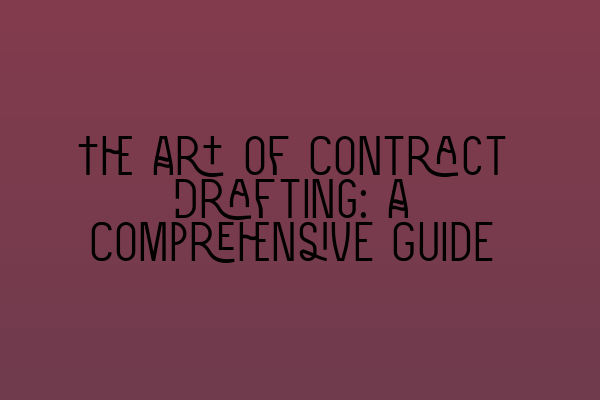The Art of Contract Drafting: A Comprehensive Guide
Contracts are the foundation of any business relationship. A well-drafted contract sets the terms and conditions that govern the agreement between parties, providing clarity, certainty, and legal protection. As a solicitor, mastering the art of contract drafting is essential to ensuring your clients’ interests are safeguarded and their objectives are met.
Why is Contract Drafting Important?
Contract drafting is a critical skill that solicitors must master to effectively represent their clients’ interests. A well-drafted contract ensures that all parties involved understand their obligations, rights, and responsibilities. It minimizes the potential for disputes by providing clarity and preventing misunderstandings.
Furthermore, a well-constructed contract demonstrates professionalism and credibility, giving clients confidence in your abilities as a solicitor. By providing clear and thorough contracts, you enhance your reputation and build trust with your clients.
Key Considerations in Contract Drafting
When approaching contract drafting, consider the following key factors:
- Clearly Define the Parties: Begin the contract by clearly identifying all parties involved and their roles. This ensures that everyone understands who they are entering into the agreement with and avoids any confusion.
- Outline the Agreement’s Terms: Carefully define the scope, purpose, and specific terms of the agreement. Clearly articulate each party’s obligations, rights, and limitations to avoid future disputes.
- Include Essential Clauses: Incorporate vital clauses such as termination, dispute resolution, governing law, and jurisdiction to protect your clients’ interests and provide legal recourse if necessary.
- Anticipate Potential Issues: Proactively address potential issues that may arise during the course of the agreement. Include clauses to address contingencies, breach of contract, and change of circumstances to protect your clients from any unexpected events.
- Be Precise and Avoid Ambiguity: Use clear and concise language when drafting the contract. Ambiguous terms can lead to misunderstandings and disputes. Consider including definitions for key terms to avoid any potential confusion.
Additionally, it’s important to stay up to date with current legal precedents and developments in contract law. This knowledge will help you draft contracts that reflect the latest legal standards and requirements.
The Role of Technology in Contract Drafting
In today’s digital age, technology plays a significant role in contract drafting. Solicitors now have access to sophisticated contract management software and tools that make the process more efficient and accurate.
Contract management software automates the drafting process by providing templates, clause libraries, and intelligent contract analysis. It enables solicitors to generate contracts faster while ensuring consistency and compliance with legal requirements.
Furthermore, using technology in contract drafting allows solicitors to track changes, collaborate with clients and other parties involved, and store contracts securely. This streamlines the contract management process, reduces administrative tasks, and improves overall productivity.
Continual Learning and Professional Development
Contract drafting is an ever-evolving skill, and it’s crucial to stay updated with the latest legal developments and best practices. Continual learning and professional development are key to honing your contract drafting abilities and delivering the highest quality service to your clients.
As a solicitor, it’s essential to engage in ongoing professional development activities such as attending seminars, webinars, and legal conferences. These opportunities allow you to expand your knowledge, learn from industry experts, and stay abreast of emerging trends in contract law.
Additionally, conducting thorough research, reading legal journals, and familiarizing yourself with real-life case studies can provide valuable insights into the nuances of contract drafting and help you improve your skills.
Conclusion
The art of contract drafting is a vital skill for any solicitor. By mastering this skill, you can effectively represent your clients’ interests, provide legal protection, and build trust and credibility. Remember to clearly define the parties, outline the agreement’s terms, include essential clauses, anticipate potential issues, and be precise and avoid ambiguity in your contract drafting. Embrace the role of technology in contract management and continuously seek opportunities for professional growth. By doing so, you will become an adept and sought-after solicitor in the field of contract law.
Related Articles:
- Barrister vs. Solicitor: A Comprehensive Comparison
- Exploring Different Solicitor Specializations: Finding Your Niche
- Embracing the Rise of Virtual Law Practices
- Navigating the Maze: Demystifying Ethical Responsibilities of Solicitors
- Unveiling Real-Life Case Studies: Insights into Legal Practice and Decision-Making
